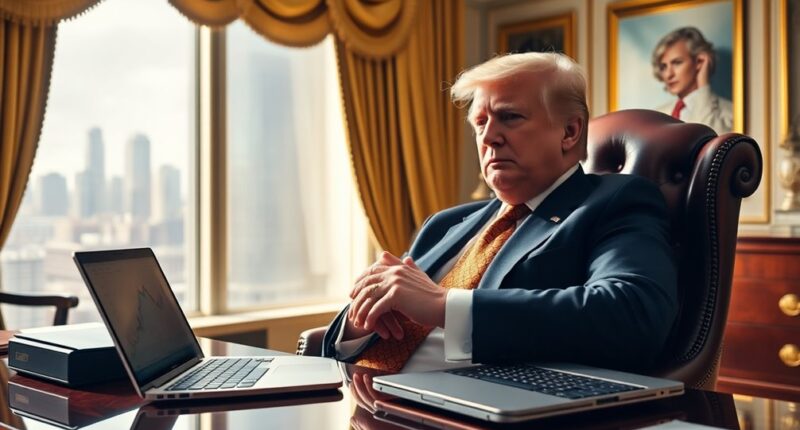You might find it interesting that Donald Trump is waiting to invest in Bitcoin until it reaches the $60,000 threshold. This cautious strategy suggests he's carefully weighing the risks and potential rewards. As a high-profile figure, his decisions could sway market sentiment significantly. What does this mean for the future of Bitcoin and other cryptocurrencies? The implications might be more far-reaching than you think.

As Donald Trump shifts from skepticism to advocacy for Bitcoin, he's made it clear that he sees cryptocurrencies as a key component of America's economic future. Initially, he labeled Bitcoin as "a scam," but his stance has evolved significantly. Now, he's promoting the idea of the U.S. becoming a leader in the cryptocurrency space. Trump's campaign promises included creating a Bitcoin reserve and fostering crypto-friendly legislation, which has resonated with many supporters and industry players alike.
You might wonder why Trump is holding off on Bitcoin investments until it hits the $60K mark. His approach reflects a strategic mindset that aligns with his vision of harnessing Bitcoin's potential for national economic growth. By advocating for a Strategic Bitcoin Reserve through an Executive Order, he's set the groundwork to hold seized Bitcoin as a store of value without making new purchases. This decision emphasizes a budget-neutral strategy, allowing the Treasury and Commerce Departments to focus on maximizing existing holdings instead of seeking new acquisitions. Additionally, the creation of a Digital Asset Stockpile aims to hold more than just Bitcoin, expanding the U.S.'s cryptocurrency portfolio.
Trump's strategic approach to Bitcoin emphasizes a budget-neutral strategy, focusing on maximizing existing holdings through a proposed Strategic Bitcoin Reserve.
The economic implications of Trump's stance are significant. He understands that Bitcoin's fixed supply and security provide strategic advantages. By centralizing the management of cryptocurrency holdings, the U.S. can better navigate the volatile crypto landscape.
Although past sales of seized Bitcoin have been criticized for costing taxpayers billions, the establishment of a Digital Asset Stockpile aims to prevent similar missteps. You can see how this reflects a shift towards a more calculated and cautious approach to managing digital assets.
During his recent crypto summit, industry leaders like Brian Armstrong and the Winklevoss twins discussed not just Bitcoin but the future of cryptocurrencies overall. The conversation highlighted the importance of regulatory guidance, which the Office of the Comptroller of the Currency later provided, allowing banks to hold cryptocurrencies. This shows how Trump's influence can steer policy in favor of the crypto industry, further solidifying his commitment to the space.
However, it's essential to consider the critics who raise concerns about potential conflicts of interest, especially regarding campaign contributions from crypto companies. While the industry's support for Trump is clear, the implications of his policies on market stability and growth remain to be seen.
As the price of Bitcoin fluctuates, your attention to these developments could offer insights into how Trump's decisions may impact your own investment strategies in the future.









